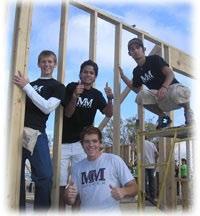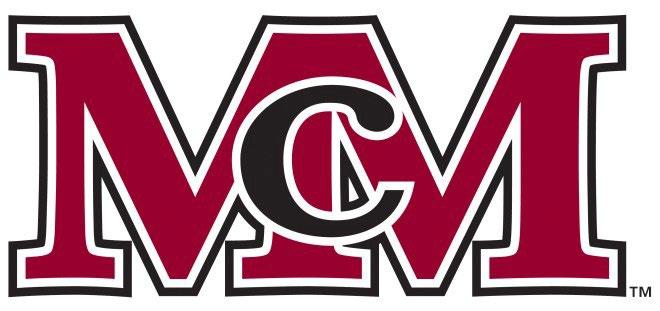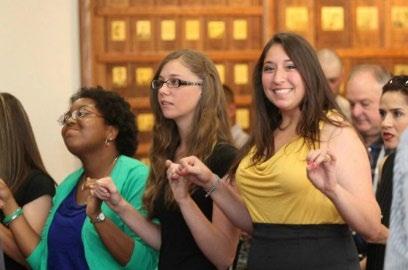
5 minute read
FrequentlyAsked Questions
SUGGESTED READINGS FOR FAMILIES
• Parents, Family, & The New College Student Experience. Books 1 & 2 by Dr. Kent D. Beeler. (1991).
Advertisement
ISBN 0-8403-6525-X
• Empty Nest…Full Heart: The Journey From Home to College.by Dr. Andrea VanSteenhouse. (1998).
ISBN 0-9619806-1-3
• Letting Go: A Parent’s Guide to Today’s College Experience. 6th Edition. By Karen Levin Coburn &
Madge Lawrence Treeger. (1997). ISBN 006095244X
• When Kids Go to College: A Parent’s Guide to Changing Relationships. by Barbara Newman & Phillip
Newman. (1992). ISBN 0-8142-0561-5
• If Life is a Game, These Are the Rules. by Cherie Carter-Scott. (1998). ISBN 0-76790-2-386
• Almost Grown: Launching Your Child From High School to College. by Patricia Pasick. (1998).
ISBN 0393317102
• Don’t Tell Me What to Do, Just Send Money. by Helen Johnson & Christine Schelhas-Miller. (2000). I
SBN 0312263740
• In Addition to Tuition: The Parents’ Survival Guide to the Freshman Year of College. by Marian Bordon,
Elsie Kearns, & Mary Ann Burlinson. (1995). ISBN 0816030995
• You’re On Your Own (But I’m Here If You Need Me): Mentoring Your Child During the College Years.
By: Marjorie Savage.
• The Launching Years: Strategies for Parenting from Senior to College Life. By Laura Kastner & Jennifer
Fugett Wyatt.
• Let the Journey Begin: A Parent’s Monthly Guide to the College Experience. By: Jacqueline MacKay &
Wanda Ingram.
Additional Resources for Families of College Students
College Parents of America
www.collegeparents.org 2000 N. 14th Street, Suite 800 Arlington, Virginia 22201-2540 (888) 761-6702 info@collegeparents.org
Dean of S tuden ts & Campus Life, Dr. Allen B. Withers
Campus Box 716, Abilene, Texas 79697 (325) 793-4680 withers.allen@mcm.edu www.mcm.edu
FREQUENTLY ASKED QUESTIONS
SHOULD MY STUDENT WORK?
Ideally students who are enrolled full-time should not work a full-time job. Being a student and maintaining a good GPA is a full-time job. However, there are many student employment possibilities available on campus for students who qualify. For more information on student employment call Sandy Lane in Career Services at 325- 793-4880.
HOW MANY CREDIT HOURS DOES AN AVERAGE STUDENT TAKE?
The average number of hours the typical freshman takes is 12-16 during his or her first semester. The number of hours a student should take depends on the individual’s circumstances. To be classified as full-time, a student must take a minimum of 12 credit hours.
HOW MUCH S PENDING MONEY DOES MY STUDENT NEED?
You know your student’s spending habits better than anyone, but here are some suggestions. 1. Create a budget. Determine what your student’s financial needs will be by detailing how they are going to be spending their money. 2. Communicate. 3. Give your student the option of access to emergency funds for unexpected expenses.
SHOULD MY STUDENT OPEN A LOCAL CHECKING ACCOUNT ?
Most local businesses will accept out of town checks or debit cards with a valid ID. If your student wishes to open a local checking account there are several banks located near campus. An ATM is located in the Campus Center. If students have a work study job, they will be able to cash the check at the McMurry Student Financial Services if it is under $100. Any McMurry checks over $100 can be cashed at First Financial Bank. First Financial Bank has locations in HEB on S. 14th , at the corner of S .14th and Willis and at other places in Abilene.
WHAT SHOULD MY STUDENT DO IF IT IS NESSASARY TO MISS A CLASS ?
It is the student’s responsibility to contact the professor. Because McMurry is such a small campus, your student’s absence will be noticed. The Office of Student Affairs (325-793-4680) can be notified in the case of illness or emergency which requires several days of missed class. In these cases, professors will be contacted and informed about the reasons for your student’s absences.

WHAT IF MY STUDENT HAS ROOMATE PROBLEMS?
Students do sometimes have difficulties with roommates. Whether a long-time friend or a new acquaintance, living together takes some time for adjustment. Students who are having problems can seek help from the Resident Assistant who lives on their floor, their Residence Hall Director, or from the Counseling Center.
WHAT IF MY STUDENT DOESN’T HAVE A CAR?
A student living on campus has access to food, laundry, and anything he/she would require on campus. For off campus excursions, students can usually find rides from their roommates, classmates, and friends. Also, Citilink, Abilene’s Bus system, has multiple bus stops near campus. Your student should be able to find the transportation he/she needs.
DOES MY STUDENT NEED A COMPUTER?
In 2007, McMurry started the M.O.V.E.(Mobile Online Visionary Education) initiative. As part of this initiative each entering full-time student will receive a laptop during War Hawk Welcome Week. The purpose of the Mobile Online Visionary Education initiative is to create an environment where all students have computer access to resources at any time. For more information about this program please visit https://information-services.mcm.edu/MOVE/. In addition to a student's issued laptop, there are also computers available for use in The Learning Commons portion of the Jay-Rollins Library along with the Academic Enrichment Center and Mac Lab in the Ryan Fine Arts Center when classes are not in session. The M.O.V.E. program also works to provide basic support for personal devices as much as possible.
WHAT IF MY STUDENT IS HAVING TROUBLE WITH A CLASS?
If your student is having trouble with a class, the first resource should be the professor. Professors have posted office hours and should be available to help your student with his/her class work. Also, student tutors are available in the AEC free of charge to any McMurry student. Tutors are available for anything from algebra and chemistry to reading and editing an English paper.
WHAT IF MY STUDENT DOESN’T KNOW WHAT TO DO IN LIFE?
Choosing a major is an introspective decision that should not be reached quickly or taken lightly. Do not be alarmed if your student takes a semester or two to choose a course of study. Also, changes in majors are common events in the lives of many students. Career Development is a resource on campus to help students understand themselves, set career goals, and choose an appropriate major.






